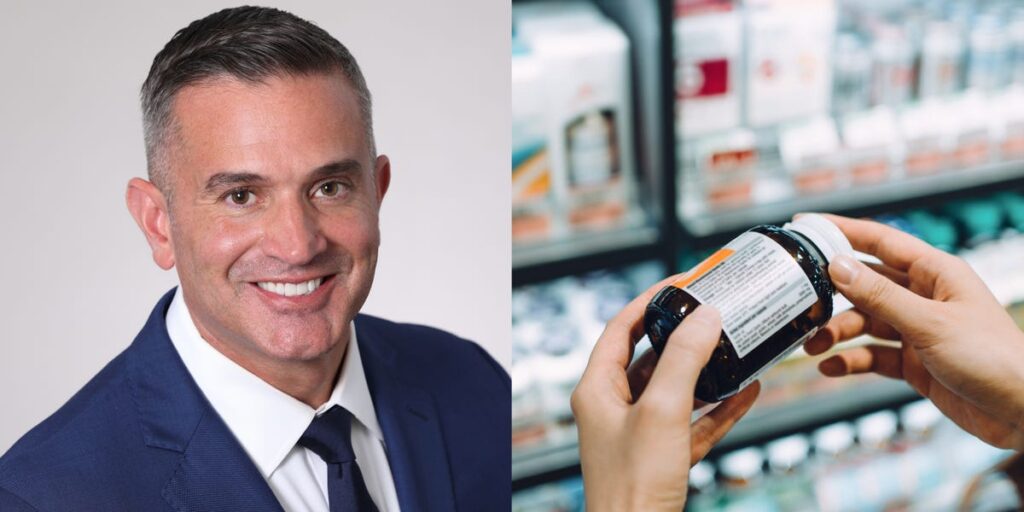- Dietary supplements aren’t FDA-approved like drugs.
- The US’ leading supplement expert recommended buying third-party certified products.
- Health professionals can help you decide which supplements are right for you, Stefan Pasiakos said.
From colostrum and creatine to lion’s mane, it feels like every few months there’s a buzzy new supplement and debate over whether it works. But another equally important question — the quality and contents of the product you choose — often gets less attention, US’ top supplement expert told Business Insider.
Dietary supplements aren’t FDA-regulated like drugs, and the onus lies on manufacturers to ensure their products are safe and accurately labeled. The FDA can remove a supplement from the market if it discovers it is adulterated or misbranded.
As such, dietary supplements aren’t uniform, Stefan Pasiakos, the director of the Office of Dietary Supplements at the National Institutes of Health, said. One multivitamin, for example, could contain a few essential vitamins and minerals, while another could feature a huge number of micronutrients mixed with various non-required nutrients, he said.
This can lead to quality control issues including contamination and inaccurate labeling, studies show. For example, one 2023 research letter published in JAMA Network Open that looked at performance-enhancing botanical ingredients found that 89% of the 57 dietary supplements tested didn’t accurately list their ingredients, while 12% contained at least one ingredient prohibited by the FDA.
A 2020 editorial published in Annals of Pharmacotherapy, meanwhile, highlighted “major quality issues” with dietary supplements, including contamination with microbes or heavy metals, unapproved ingredients, lower than stated doses, and products not containing an ingredient stated on the label.
Pasiakos therefore encourages people to do their “homework” before taking a supplement: “All I would say is that people make sure that they become educated on these products, understand what’s in them, and know that the industry is not out to get them. But there are certainly aspects of certain dietary supplements that may be considered unsafe.”
He shared three tips for sourcing good-quality supplements and assessing whether they’re right for you.
Look for supplements with third-party verification
If you’re concerned about what’s in a supplement, buy a product that has been verified by a third-party organization, Pasiakos said.
There are several trustworthy organizations that rigorously test supplements to ensure that they contain what the label says, and no contaminants, he said. They also help companies ensure they’re meeting government guidelines. However, such organizations don’t test how effective supplements are or back the company’s health claims.
Pasiakos highlighted NSF certification and the US Pharmacopeia Verification Program.
Usually, if a product has been third-party verified, it will say so on the packaging or company website.
Ask your healthcare provider for personalized recommendations
Pasiakos recommends speaking to a doctor or healthcare provider before trying a new supplement.
They might be able to refer you to a dietitian or pharmacist who is knowledgeable about supplements and can advise you depending on your specific needs, he said. For example, if you’re already taking supplements or prescription drugs, they will know about potential interactions.
A dietitian will also assess your diet as a whole and give you nutritional recommendations, which is important because supplements should complement, not replace, a healthy diet, he said.
Do research based on reputable sources
If you can’t get advice from a medical professional, it’s important to get information from a reputable source, Pasiakos said.
“There’s information everywhere. You just type in a given supplement online and you’ll get everybody under the sun with an opinion on whether a dietary supplement works or not,” Pasiakos said.
The ODS has lots of information on its website, including dietary supplement fact sheets, which are up-to-date, evidence-based reviews of the available information, he said. There’s a fact sheet for most existing supplement ingredients that explains what it is, how it works, and the evidence for or against claimed health benefits.
Pasiakos also pointed to the National Center for Complementary Integrative Health, which is part of the NIH, and the FDA’s website as good sources of information on supplements.
Read the full article here


